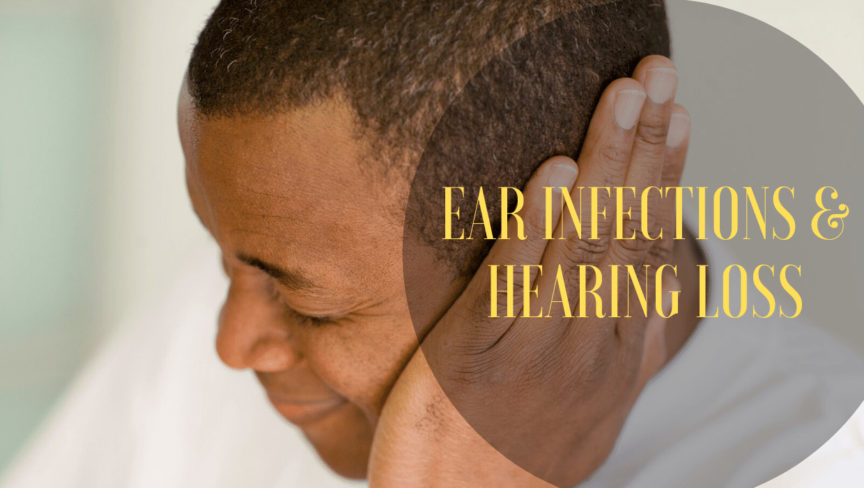- The Harm of Smoking to the Ears - April 9, 2025
- The Importance of Exercise for Hearing Health - March 11, 2025
- Movie Theaters and Hearing Aids - February 13, 2025
Did you know that ear infections can cause temporary hearing loss? Various factors can impair hearing temporarily and permanently. Existing medical conditions, genetic history, and environmental exposure to loud noise can damage hearing. Ear infections, a common health issue that people experience, can impact the middle part of our ears which is critical to the auditory system.
How We Hear
Our sense of hearing involves an intricate process that requires the complete function of the ears. There are three main components of the ear:
- Outer Ear: this includes the most visible part of the ear, the ear canal, and the ear drum which separates the outer and middle ear.
- Middle Ear: location of the ossicles – three tiny bones that are connected – and the eustachian tube which is responsible for maintaining pressure in the ear.
- Inner Ear: consists of the cochlea, a labyrinth like structure that is filled with fluid and hair cells- as well as the auditory nerve.
The outer ear collects sound from the environment which travels down the ear canal and strikes the ear drum causing it to vibrate. This amplifies the sound waves and the ossicles help push the soundwaves further into the inner ear activating the cochlea. The fluid and hair cells are activated and this movement helps translate the soundwaves into electrical signals that are sent to the brain through the auditory nerve. The brain is then able to process and make meaning of the sound we hear. When there is any injury or damage to these parts, it disrupts this process and results in hearing loss.
Conductive Hearing Loss
There are three types of hearing loss: sensorineural, conductive, and mixed. Sensorineural hearing loss is the most common type which is caused by damage in the inner ear and is permanent. In contrast, conductive hearing loss can be caused by impact to the outer and/or middle ear which can be caused by several things such as: an accumulation of wax, abnormal bone growths and protrusions, tumors, inserting foreign objects in the ear, and ear infections.
These obstructions create barriers that prevent, or limit, sound from travelling down the ear canal and reaching the inner ear. This causes sound to be muffled which makes it difficult to identify and hear distinct words. Ear infections can be cured, alleviating the temporary hearing loss they can cause.
Ear Infections
Ear infections are the result of bacteria and viruses that are present in the middle ear. Though people of all ages can experience ear infections, they are more common among children. This is because their eustachian tube is still developing – it is shorter and narrower which allows bacteria to reach the middle ear more easily. There are different types of ear infections that can contribute to temporary hearing loss:
- Otitis Media: is an infection resulting from a cold, flu, or allergy which causes congestion and swelling. Specifically, the eustachian tube that connects the middle ear to the back of the throat and is responsible for regulating air pressure and draining fluid in the middle ear, can swell. This allows fluid to build up in the middle ear which can become infected.
- Otitis Externa: generally referred to as swimmer’s ear which is an infection of the ear canal. This is commonly experienced after swimming and there is excess fluid that remains in the ear. Increased moisture in the ear can break the skin in the ear, allowing bacteria to be absorbed. Though this is commonly caused by spending lots of time in the water, there are other ways this skin can be irritated leading to swimmer’s ear including: scratching the ear canal, dry skin, aggressive use of cotton swabs etc.
Ear infection causes various symptoms including: pain, headache, pus, discharge of fluid, pressure in the ear, and difficulty hearing. Fortunately, these ear infections are highly treatable!
Treatment
The type and severity of the ear infection informs the most effective treatment. Ear infections can clear on their own and people may take over the counter medication to relieve any pain. Conductive hearing loss caused by ear infections is commonly treated with antibiotics which cure the damage in the middle ear and can restore hearing.

